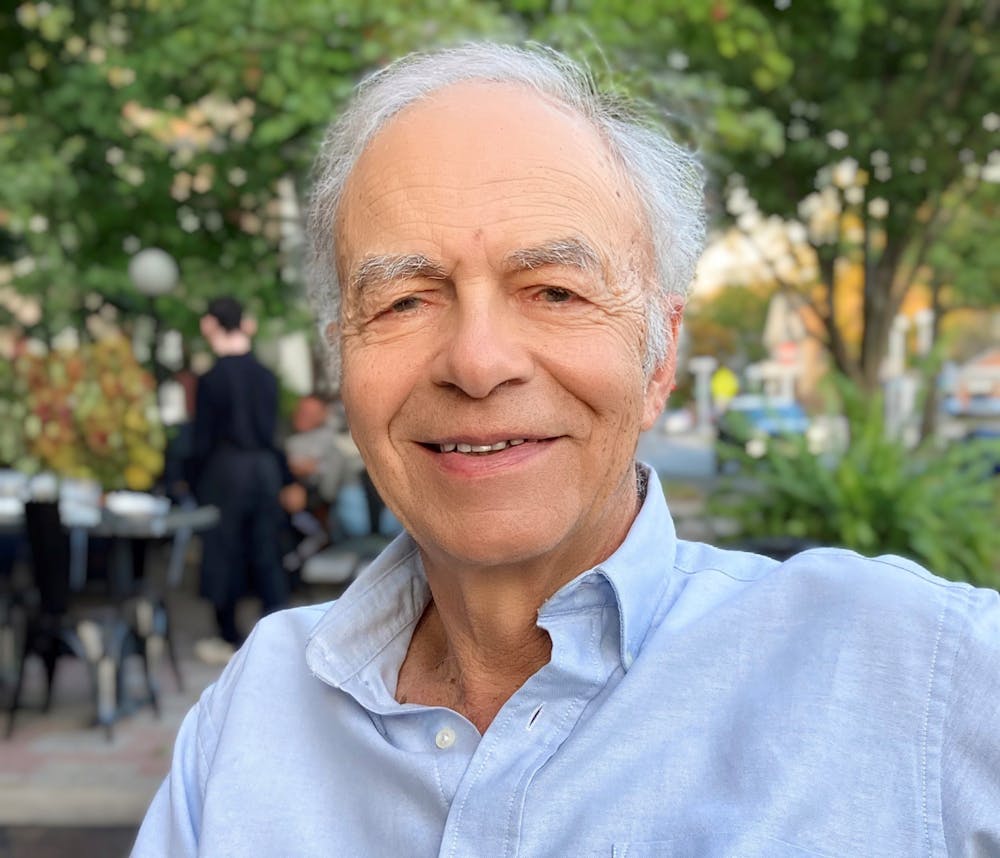On Sept. 7, Professor of Bioethics Peter Singer was named the recipient of the 2021 Berggruen Prize for Philosophy & Culture. He joins past recipients including Ruth Bader Ginsburg and Paul Farmer, and he plans to donate the entirety of the $1 million award.
Singer is a philosopher who began teaching at the University in 1999. He is known for advocating for humanitarian giving and animal rights, as well as for his controversial views on the viability of disabled lives.
According to the announcement from the Berggruen Institute, the prize is “given annually to thinkers whose ideas have profoundly shaped human self-understanding and advancement in a rapidly changing world.”
The Berggruen Jury is chaired by Kwame Anthony Appiah, former Professor of Philosophy and the University Center for Human Values. Singer received an email from Appiah a few weeks ago in which Appiah requested a Zoom in order to tell him some news. Singer found out he won the award during his call with Appiah.
“Few academic philosophers have ever had the impact of Peter Singer,” Appiah said in the announcement from the Berggruen Institute.
In an interview with The Daily Princetonian, Singer expressed his gratitude for how the prize commends his life’s work.
“It's a form of recognition for what I've been trying to do for the past 50 years, that is, to do philosophy in a way that has an impact on the world,” he said.
“The second thing is that it comes with a million dollars, which is a great opportunity to do good. I don’t need that million dollars myself, so I immediately started thinking of what I could do with it to have the best possible impact,” he continued.

Singer has no desire to keep the prize money. He has argued in papers including “Famine, Affluence, and Morality” that people have the obligation to give as much money as possible to humanitarian causes around the world.
“I really don't need it and just to take it or even part of it and spend it on myself would have little impact on my well-being and happiness,” Singer said.
Singer plans on donating half of the award to The Life You Can Save, an organization he started in 2009 that curates a group of nonprofits that help the most lives per dollar. Since its founding, $35 million in donations have gone to the most effective charities fighting global poverty, according to Singer. He said every dollar spent by The Life You Can Save results in an average of $17 in donations for the nonprofits the organization recommends.
A portion of the prize money will go towards organizations working to combat animal cruelty, specifically factory farming. Much of Singer’s philosophical work focuses on animal rights, and this work stands out to Singer as particularly influential.

“I’m proud of having played a role in making people more aware of animal suffering and the moral status of animals,” he said.
The public will have input on the recipients of the last portion of the prize money. This includes Singer’s students in his class CHV 310/PHI 385: Practical Ethics.
Every year, Singer runs a class exercise he calls a giving game, during which each precept receives $100 to allot to their desired organizations and charities. Singer said that the class this year will get more money to dedicate to the organization of their choice.
Singer received this award despite years of backlash from disability rights advocates, including a group called Not Dead Yet that blockaded Nassau Hall in 1999 to protest his appointment. In his book “Practical Ethics,” Singer suggested that parents of a newborn with a disability should be able to end the life of their baby.
“I think many of those criticisms are to some extent based on a misunderstanding of my views,” he said.
Singer clarified that he does not think every disabled infant should be killed and instead advocates for parental decision making about the viability of their child.
“My position is that just as pregnant women now have the option of ending the lives of babies after a prenatal diagnosis showing a disability, and just as parents now have the option in consultation with doctors of withdrawing life support from very severely disabled babies who need life support, I think that they should have the option of ending the lives of severely disabled babies if they judge that’s in the best interest of their child and the family,” he explained.
At the same time, he said he understands that “people are still disturbed by that.”
“I should say, as I’ve been saying for many years … I fully support the right of people with disabilities to live their lives as fully as possible,” he continued.
While these views are considered controversial, Singer has embraced the opportunity to spark public discourse, recently founding the Journal of Controversial Ideas.
“I welcome criticism of my views. People should be free to express views critical of mine, just as I should be free to express my views, and that's something that's been important to me throughout my time at Princeton,” he said.
Singer will receive the prize at a ceremony in Los Angeles, Calif. next spring.
Naomi Hess is an Associate News Editor who focuses on university policy and alumni affairs. She can be reached at nihess@princeton.edu or on Twitter at @NaomiHess17.








